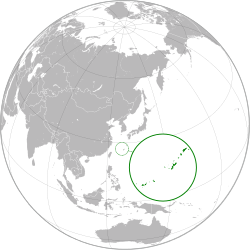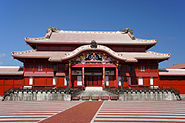United States Military Administration of the Ryukyu Islands
| |||||||||
|---|---|---|---|---|---|---|---|---|---|
| 1945–1950 | |||||||||
 Flag
Flag | |||||||||
 Territory controlled by USMGR Territory controlled by USMGR | |||||||||
| Status | Military occupation | ||||||||
| Capitaland largest city | Naha | ||||||||
| Common languages | |||||||||
| U.S. President | |||||||||
| • 1945 (first) | Franklin D. Roosevelt | ||||||||
| • 1945–1950 (last) | Harry S. Truman | ||||||||
| Governor | |||||||||
| • 1945 (first) | Simon Bolivar Buckner Jr. | ||||||||
| • 1950 (last) | Robert S. Beightler | ||||||||
| Historical era | Cold War | ||||||||
| • Battle of Okinawa | 1 April – 22 June 1945 | ||||||||
| • Civil administration | 15 December 1950 | ||||||||
| Currency |
| ||||||||
| |||||||||
| History of Ryukyu | ||||||||||||||||||||||||||||||||||||||||||||||||||||||||||||||||||||||||||||||||
|---|---|---|---|---|---|---|---|---|---|---|---|---|---|---|---|---|---|---|---|---|---|---|---|---|---|---|---|---|---|---|---|---|---|---|---|---|---|---|---|---|---|---|---|---|---|---|---|---|---|---|---|---|---|---|---|---|---|---|---|---|---|---|---|---|---|---|---|---|---|---|---|---|---|---|---|---|---|---|---|---|
  | ||||||||||||||||||||||||||||||||||||||||||||||||||||||||||||||||||||||||||||||||
Periods
|
||||||||||||||||||||||||||||||||||||||||||||||||||||||||||||||||||||||||||||||||
|
Topics |
||||||||||||||||||||||||||||||||||||||||||||||||||||||||||||||||||||||||||||||||
The United States Military Government of the Ryukyu Islands abbr. USMGR (琉球列島米国軍政府, Japanese: Ryūkyū-rettō Beikoku Gunseifu, Okinawan: Rūcū ʔAmirika Minhyōjōju), also referred to as U.S. Ryukyu Islands, was the government in the Ryukyu Islands, Japan (centered on the Okinawa Island) from 1945 to 1950, whereupon it was replaced by the United States Civil Administration of the Ryukyu Islands (USCAR).
Background
The first prolonged American presence in the Ryukyu Islands commenced with the arrival of Commodore Matthew C. Perry in May 1853, on Okinawa. A bit more than one year later, this presence ended when Perry left. Perry had hoped to use Okinawa as a springboard to opening up relations with Japan during the Bakumatsu period. Almost 100 years later, Americans returned to the islands, beginning in April 1945, after the last battle of World War II came to an end. Again, the American presence was as a stepping stone to Japan.
Government system
The government was headed by the Military Governor (軍政長官, Gunsei Chōkan) and his second-in-command, the Chief Military Government Officer (軍政府長官, Gunsei-fu Chōkan). They were assisted by the Deputy Commander of the Military Government (軍政府副長官, Gunsei-fu Fuku-chōkan).
Governors
Main article: List of U.S. governors of the Ryukyu Islands § United States Military Government of the Ryukyu Islands (USMGR, 1945–1950)See also
[REDACTED] Media related to United States Military Government of the Ryukyu Islands at Wikimedia Commons
- United States Civil Administration of the Ryukyu Islands
- Government of the Ryukyu Islands, the body of Okinawan self-governance from 1952 to 1972.
- 1945 Katsuyama killing incident
- ja:琉球列島米国軍政府
- Naval Base Okinawa
References
- "Records of U.S. Occupation Headquarters, World War II". National Archives and Records Administration. 2016-08-15. 260.12 Records of the U.S. Civil Administration of the Ryukyu Islands (USCAR) 1945–72. Retrieved 2016-09-09.
- ^ Fisch, Arnold G. Jr. (1988). Military Government in the Ryukyu Islands: 1945–1950 (PDF). Army Historical Series. Washington, D.C. LCCN 2017491247. OCLC 258121764. Archived (PDF) from the original on 2022-03-21. Retrieved 2022-05-14.
{{cite book}}:|work=ignored (help)CS1 maint: location missing publisher (link)
26°30′N 128°0′E / 26.500°N 128.000°E / 26.500; 128.000
Categories:- 1945 establishments in Japan
- 1950 disestablishments in Japan
- Former regions and territories of the United States
- Government agencies established in 1945
- Government agencies disestablished in 1950
- History of United States expansionism
- Japan–United States relations
- Okinawa under United States occupation
- Postwar Japan
- Shōwa era